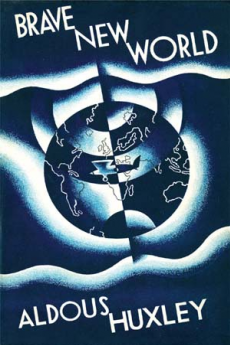
If ‘Frankenstein’ and ‘War of The Worlds’ are the parents of the science fiction genre - then Aldous Huxley’s ‘Brave New World’, one of the first great dystopic novels, is their child. Set in the year 2540 AD, or, as the book states, 632 A.F. (after Ford), Huxley anticipates a world where reproductive technology, the gap between social classes, and psychological manipulation has made leaps and bounds in development, becoming the staple factors in society. The world described, stranger even then Huxley’s first name, has fascinated readers for so many years - so much so that the novel was listed in both The BBC’s recent ‘Big Read’, The Observer’s ‘The top 100 greatest novels of all time’ and in Modern Library’s 1999 ‘100 Best English-Language Novels of the 20th Century’. Receiving such high praise, it is hard to imagine that the text has any faults at all. However, after a thorough reading, it seems that it may possess some flaws. After all, no book is perfect.
The novel begins with The Director touring students round The Department of Hatcheries and Conditioning, where young children are, for want of a better word, born, and raised. When sleeping, for example, a voice is played to the children, whispering to them messages of conformity and passiveness. This allows an informative introduction to the world of the story, providing each reader with a little insight into the set up of this future. Eventually, we are introduced to the novel’s protagonists; Lenina Crowne and Bernard Marx, who represent the opposite to the society. Lenina symbolises those who fit in - she is socially accepted, works hard, and does not question the conditioning she has experienced. Bernard, on the other hand, is classed as a ‘misfit’ - he is physically inferior to many of his colleagues, and is aware of the inner workings of conditioning, giving him the knowledge to disapprove of the methods. This quiet disagreement with such an authoritarian state, combined with the inferiority complex due to his appearance means that Bernard is exceedingly unhappy with his life, and society - the direct opposite to Lenina.
Still, Bernard attempts to court Lenina - both visiting New Mexico, they come across a tribe of Native Americans, who do not belong to the society. Yet they find a young white man, who was raised as part of the tribe, and decide to take this savage ‘John’ with them. This also allows an outsider perspective on this totalitarian world - presenting an opportunity for it to be destroyed, John being of an Alpha class, due to his high-ranking father. But will the state be overthrown, or be constant? Only reading the novel can answer that question.
Despite perhaps the indecisiveness of which characters are the protagonists, ‘Brave New World’ is certainly deserving of the praise it receives. A significant and well-written novel, Huxley’s imagination seems to be vast, the intricacies and details of the New World reflecting that of Tolkien. Although (thankfully) inaccurate about the future, the text is certainly worth a read.
Image: https://upload.wikimedia.org/wikipedia/en/6/62/BraveNewWorld_FirstEdition.jpg

0 Comment:
Be the first one to comment on this article.